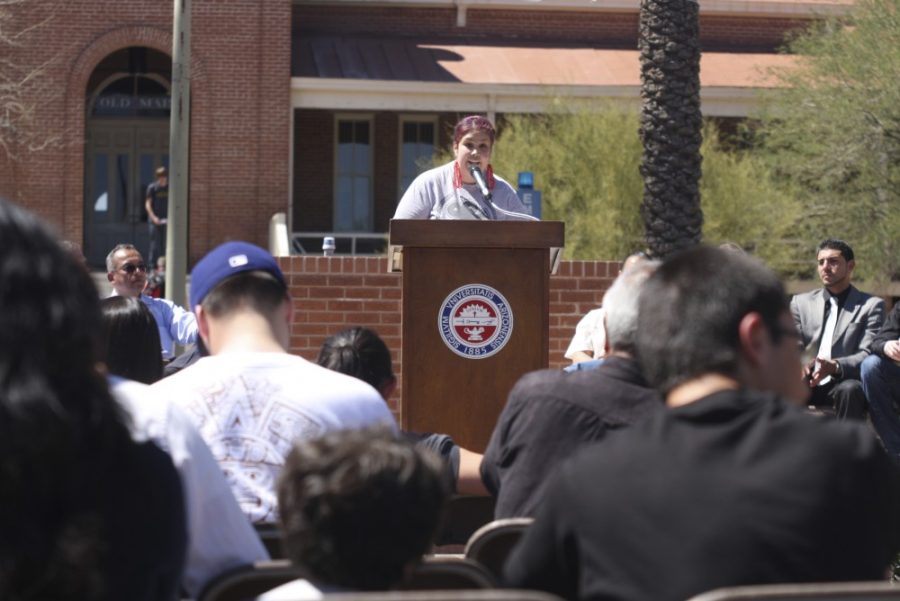The introduction to Kim Dominguez’s speech was brief and to the point.
“I’m angry, so I have to read from what I wrote, otherwise I’ll say all kinds of crazy things,” she said.
Dominguez, an undergraduate student in the Mexican-American studies program, was one of several speakers at a forum hosted on Thursday by the Associated Students of the University of Arizona on the UA Mall. The forum addressed the removal of ethnic studies courses from Tucson Unified School District’s curriculum, formerly filed as House Bill 2281.
The goal of the forum was to educate the UA community about the issue and encourage public discourse between proponents and opposition, according to ASUA Senators Jason Brown, a political science senior, and Blanca Delgado, a public health junior.
HB 2281 was originally proposed in 2010 by Arizona Attorney General Tom Horne, who previously served as the state superintendent for public instruction. The bill sought to end ethnic studies in public schools throughout the state, arguing that it violated the policy “that public school pupils should be taught to treat and value each other as individuals and not be taught to resent or hate other races or classes of people.”
With ethnic studies courses now removed from TUSD’s curriculum as of Jan. 10, members of the UA community were encouraged to voice their opinions after hearing speakers from both sides of the debate.
Dominguez credited the Mexican-American studies program she went through in high school for why she is now a UA student, and went on to say the law’s proponents were “white, privileged men who certainly don’t make it any easier for a woman of color to not resent them after attacking and destroying a program that saved (her) life and did not belong to them.”
“If we call it like it is, these white privileged men are straight-up racist, living the legacy of manifest destiny, and HB 2281 is a white-only sign for Arizona 2012,” she said.
Roberto Rodriguez, an assistant professor of Mexican-American studies, argued that the ethnic studies ban “is not an attack on Mexican or Chicano or even indigenous studies. This is an attack on the very idea of education.”
Mark Stegeman, president of TUSD’s governing board, explained the ban’s goals and purposes. Stegeman argued that the law was developed to broaden the district’s curriculum, and he went on to cite an achievement gap between Latino students and students of other races. The statistic was a direct result of a desegregation lawsuit, he said, and it showed that some have been “rightly unsatisfied with (TUSD’s) performance.”
Nolan Cabrera, an assistant professor of educational policy studies and practice, also spoke out against the ban and how controversial it has become. The law, he said, was not sensible.
“While I’m sensitive to the pragmatic needs of TUSD, at the same time I think that if we are locked only in pragmatism, we are forever going to be fighting this battle,” Cabrera said.
The remainder of the hour-long presentation included an impassioned speech from Erin Hodge, another Mexican-American studies undergraduate. Hodge recounted her time learning about diversity in high school, saying that learning about other cultures, as well as issues including rape, poverty, immigration, violence and sexuality, are important issues to be educated about because they affect all cultures in different ways.
“These issues are not inappropriate topics for 16, 17-year-olds,” Hodge said. “These topics already affect our lives.”








